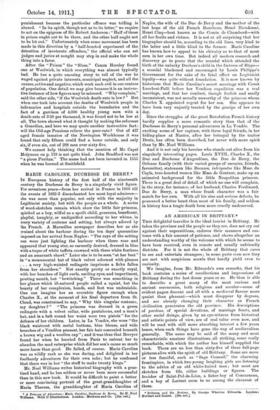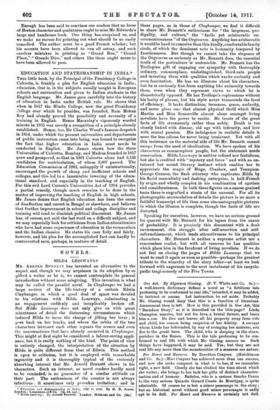AN AMERICAN IN BRITTANY.* Tam delightful traveller is the ideal
tourist in Brittany. He takes the province and the people as they are, does not cry out against their superstitions, endures their manners and cus- toms with a fair amount of patience, and shows altogether an understanding worthy of the welcome with which he seems to have been received, even in remote and usually unfriendly districts. For it is not the whole of Brittany that cares to see and entertain strangers ; in some parts even now they are met with suspicious scowls that hardly yield even to curiosity.
We imagine, from Mr. Edwards's own remarks, that his book contains a series of recollections and impressions of Brittany during the last dozen years or so. He thus is able to describe a great many of the most curious and ancient ceremonies, both religious and secular—some of evident pagan descent and all with a mediaeval flavour more quaint than pleasant—which must disappear by degrees, and are already changing their character as French civilization penetrates the old province. His descriptions of pardons, of special devotions, of marriage feasts, and other social doings, given by an eye-witness from historical and artistic points of view, are of real value even now, and will be read with still more absorbing interest a few years hence, when such things have gone the way of medimvalism generally. The same may be said of the many and most characteristic amateur illustrations, all striking, some really remarkable, with which the author has himself supplied the book. There are no less than sixty-five of these full-page pictures alive with the spirit of old Brittany. Some are more or leas fanciful, such as "Sage Counsel," the charming frontispiece, in which two young laughing girls are listening- to the advice of an old white-haired man ; but most are sketches from life, either buildings or figures. The kreisker of Saint-Pol-de-Leon, a fisher-boy of Concarneau, and a boy of Lorient seem to us among the cleverest of these.
• Brittany and the Bretons. By George Wharton Edwards. London, Herbert and Daniel. [Mc net.]
Enough has been said to convince our readers that no lover of Breton character and quaintness ought to miss MrEdwards's large and handsome book. One thing has surprised us, and we make no excuse for pointing out what should be so easily remedied. The author must be a good French scholar; but his accents have been allowed to run all astray, and such careless mistakes in printing as "Grand Rue," "Grand Place," "Grande Dieu," and others like them ought never to have been allowed to pass.



















































 Previous page
Previous page